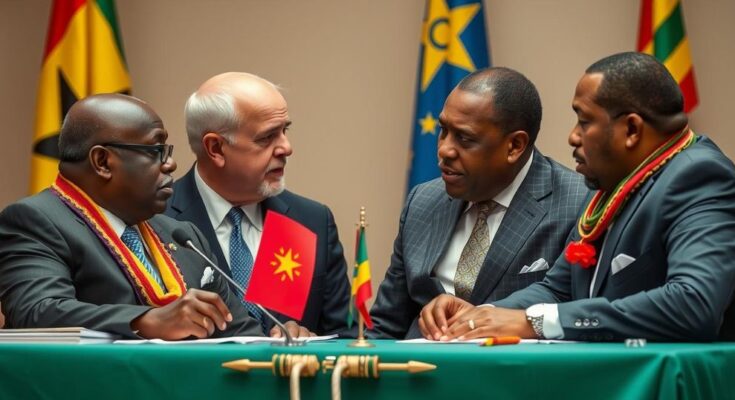On December 11, 2024, Turkey successfully mediated a reconciliation agreement between Ethiopia and Somalia. Triggered by prior tensions over a contentious MoU with Somaliland, the compromise aims to enhance cooperation and stability in the Horn of Africa. The agreement receives international backing from organizations like the UN and the US, indicating a consolidated push for lasting peace while addressing regional security challenges.
On December 11, 2024, Turkey successfully mediated a historic reconciliation agreement between Ethiopia and Somalia, highlighting Turkey’s increasing diplomatic influence in the Horn of Africa. This accord emerged from high-level discussions in Ankara and aims to enhance cooperation between the two nations following tensions rooted in a controversial 2024 Memorandum of Understanding (MoU) pertaining to Somaliland. The declaration received international endorsement from prominent organizations, including the United Nations, the United States, and the African Union, indicating a broad commitment to peace in the region.
The tensions between Ethiopia and Somalia escalated after Ethiopia negotiated an MoU with Somaliland, granting it access to the Red Sea coastline for a naval base. This agreement raised alarms in Somalia, which viewed it as a challenge to its territorial sovereignty, straining bilateral relations. Somalia rallied support, particularly from Egypt and its neighbors, while Ethiopia garnered backing from Uganda and Kenya, aggravating geopolitical rivalries in the region. The situation demanded urgent mediation, paving the way for Turkey’s proactive role.
Turkey’s initiative, termed the ‘Ankara Process’, commenced on July 1, 2024, involving talks among officials from both nations. Subsequent diplomatic efforts continued through the UN General Assembly meetings, culminating in the signing of the Ankara Declaration in December 2024. This declaration reaffirms both countries’ commitment to sovereignty and collaboration, facilitating discussions to solidify their economic relationship while respecting each nation’s integrity.
The Ankara Declaration represents a crucial development for Ethiopia, granting it potential access to the Red Sea while alleviating regional tensions. Prime Minister Abiy Ahmed’s diplomatic framework aims to prioritize economic recovery over conflict in the aftermath of the Tigray war. Furthermore, a significant IMF deal offers reassurance for Ethiopia’s stabilization and economic reconstruction.
Conversely, Somalia may benefit from this agreement by potentially improving its security situation against threats from Al Shabaab while affirming its stance on peaceful conflict resolution. However, internal dissent may arise due to nationalist sentiments questioning the government’s compromises on sovereignty. Both governments must adeptly manage these concerns to support the agreement’s legitimacy.
Additionally, Somaliland’s aspirations for international recognition complicate the reconciliation effort. Newly elected President Abdirahman’s strengthened connections with Ethiopia, coupled with potential U.S. recognition under a forthcoming administration, might challenge Somalia’s sovereignty claims and exacerbate tensions. The proposal to establish a U.S. military base in Somaliland to protect shipping lanes further complicates the geopolitical landscape.
The ambiguity surrounding Ethiopia’s naval ambitions persists, yet French President Emmanuel Macron’s visit has reignited France’s interest in fostering ties with Ethiopia regarding maritime capabilities, underscoring the strategic need for access to the Red Sea. Macron’s previous withdrawal from developing Ethiopian naval resources due to human rights concerns had signaled a stalled relationship, but his renewed engagement reflects a desire to address these issues through constructive dialogue.
The Ankara Declaration underscores Turkey’s expanding role as a diplomatic intermediary in Africa, demonstrating reliability and a commitment to stabilizing conflict in the region. For the agreement to ensure lasting peace, ongoing engagement from all parties involved remains critical. Ethiopia’s relationship with Somalia necessitates careful navigation to avoid renewed hostilities, while Somalia’s government must address internal dissent and highlight the benefits of the agreement. Turkey’s continued diplomatic involvement, supported by international stakeholders, will be vital for the successful implementation of this peace process.
The Ethiopia-Somalia conflict has deep roots, primarily stemming from Ethiopia’s 2024 MoU with Somaliland, which has escalated tensions due to concerns over territorial sovereignty. With the history of unresolved issues between these nations, including military alignments and geopolitical strategies involving neighboring countries, the need for external mediation became pressing. Turkey’s intervention through the Ankara Process marks a significant moment in regional diplomacy, with the potential to reshape relationships and foster stability in a historically volatile region, especially in light of the challenges following the Tigray conflict and ongoing security threats from groups like Al Shabaab.
In summary, the Ankara Declaration represents a significant diplomatic achievement aimed at reconciling Ethiopia and Somalia after prolonged tensions exacerbated by geopolitical rivalries and internal disputes. Turkey’s mediation has established a framework for cooperation, addressing sovereignty concerns and fostering economic ties. However, the implementation of this agreement will require careful management of domestic dissent in Somalia, considerations regarding Somaliland’s ambitions, and mutual commitment from all parties involved to ensure a sustainable resolution to the conflict in the Horn of Africa.
Original Source: www.idsa.in




